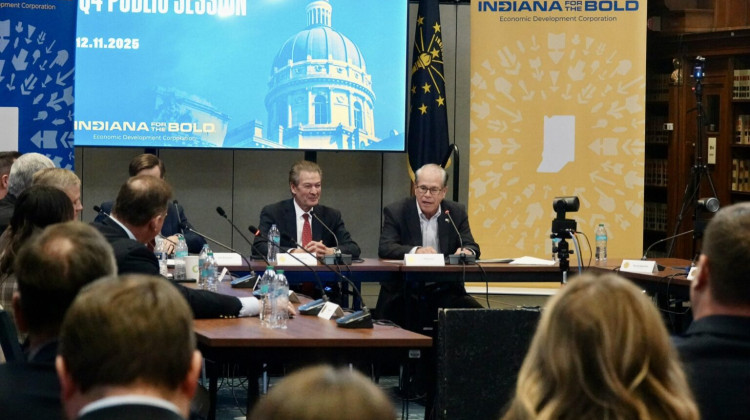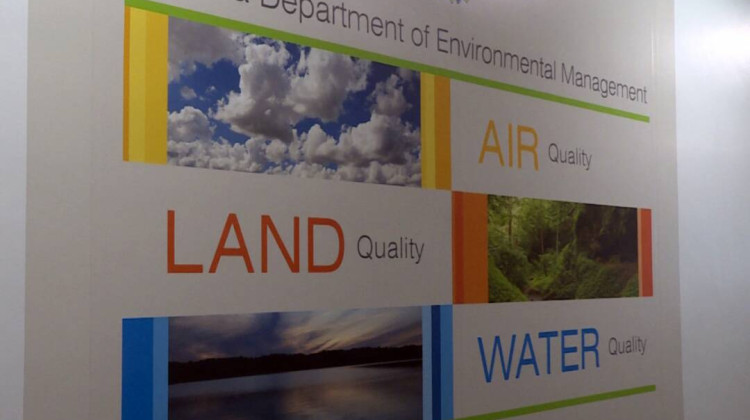
After firing tear gas canisters into the crowd Saturday night, IMPD officers began spraying pepper spray in the area.
Lauren Chapman/IPB NewsOver the weekend, hundreds of demonstrators across Indiana joined national protests against police violence. Most of the protesters were largely peaceful. Police clashed with crowds in response to thrown objects and vandalism by firing tear gas, pepper spray pellets and flares.
Indianapolis
A gathering of a few hundred people in downtown Indianapolis Friday that stretched from the afternoon until night ended in police officers releasing tear gas and shooting pepper balls at the crowds.
That set off hours of chaos downtown that stretched into early Saturday when a CVS drug store was set on fire.
The protest, like others around the country, follows the death of George Floyd while he was in Minneapolis police custody.
Officers with the Indianapolis Metropolitan Police Department wore riot gear as they faced off with protesters at the corner of Market and Illinois streets. Police shot gas canisters and pepper balls. Protesters threw parking cones and other projectiles toward officers. Windows of businesses near the Statehouse were smashed.
On the minds of many is the recent shooting death of Dreasjon Reed by an IMPD officer earlier this month.
On Saturday, hundreds gathered across the downtown area, including Monument Circle and the Indiana War Memorial – where they filled the plaza facing Vermont Street.
Paul Napier brought his young son with him as he marched through the streets.
"I want him to grow up understanding these issues and hopefully by the time he's my age he won't be seeing this," says Napier.
Indianapolis City-County Councilor Ali Brown handed out masks on Monument Circle.
"There is a lot of rage, and I can't understand what it's like to be black or the black experience," says Brown. "I'm here to support my friends and my community."
IMPD Deputy Chief Josh Barker says it's important to delineate between the violence and the peaceful protests at Monument Circle and the Indiana War Memorial.
"In the very beginning today we saw what we consider one of the most successful protests that Indianapolis has experienced," Barker says. "You had between 300 and 600 people that came down to peacefully gather."
Barker says IMPD worked with the organizers of those protests to set expectations and provided traffic control so the groups could move throughout the city.
But after police said a window was broken at the City-County Building, police gathered on Market Street and warned protesters that their gathering was illegal. Around 9 p.m. police fired tear gas as some protesters threw objects at officers.
Throughout the rest of the evening, IMPD officers and protesters clashed for the second consecutive night. The protests mirrored those in other cities across the country set off by anger over the death of a black man in police custody.
In downtown Indianapolis, windows were smashed, stores looted, tear gas filled the air and fires burned in streets. Police said they received so many reports of shots fired that they lost count.
Hundreds of people gathered at the Statehouse Sunday to hear the city’s faith leaders call for peaceful protests and accountability from elected officials and the police.
Among the demands made were independent investigations of police action shootings, training in violence de-escalation for officers and investment in community mental health treatments.
The scene of dozens holding up signs in sunlight, from small children to the eldery, was a stark contrast to what had taken place the night before on the same grounds. At one point Saturday officers could be seen standing on the darkened Statehouse grounds as they fired projectile guns at protesters who marched north on Capital Avenue a few hours after peaceful protests in the city turned into riotous groups.
While those who spoke on the Statehouse steps decried the violence, damage and looting of the previous two nights, some said it was time for the reason behind the anger to be understood.
“We need to have some understanding. We need to understand the generation that feels like nobody listens to them,” said Pastor J. Rashad Jones, of the Sanders Temple Church of God in Christ on the city’s Eastside. “We need to understand the generation that feels like nobody cares. Because this generation feels nobody is hearing their cry.”
“Do we have to have another George Floyd? I thought Eric Garner was enough.”
Two hours before the city’s curfew, officers again fired tear gas, pepper spray pellets and flares into the crowd marching through Indianapolis.
During a press conference at the start of the curfew, Indianapolis Metropolitan Police Department Chief Randal Taylor said he did not have specific details of events that led up to police using tear gas, but said he heard officers felt they were being surrounded by protesters.
"I'm confident that the officers that have used tear gas or pepper balls did do in a righteous fashion," Taylor said.
Fort Wayne
Organized by Alisha Rauch to protest the killing of George Floyd in Minnesota on Memorial Day by police officers, the protest started around 5 p.m. with a few hundred gathering along both sides of Clinton Street.
For more than three hours, a diverse crowd of white, black, and brown; from old to very young carried homemade signs along the sidewalk, chanting “Black Lives Matter” and “No Justice, No Peace” through masked faces.
Throughout the early evening, a few protesters mingled with the heavy traffic on Clinton Street, but mostly stayed on the sidewalk. Motorists slowed, honking their horns and raising fists through sunroofs and out of windows. Many captured pictures with their phones, yelling their support.
But at about 8 p.m., as the protesters moved north up Clinton Street to the Martin Luther King Jr. Bridge, they began to block Clinton Street in its entirety, filling the intersection at Main Street, in an event broadcast live on social media streams by local television stations and citizen cell phones.
According to the Fort Wayne Police Department, there were 29 people arrested Friday night as clashes with police ran into 2 a.m. Saturday.
Windows were smashed, planters tipped over and other vandalism occurred throughout the downtown area.
The situation deteriorated even more on Saturday with the conflicts breaking out earlier in the day, particularly over the protesters’ occupation of the intersection of Clinton and Main streets and the Courthouse Green.
Close to 70 people were arrested Saturday, one officer was taken to the hospital with a non-life-threatening injury, and a protester suffered the loss of an eye when he was hit in the face by a projectile fired by police.
Hundreds gathered for an interfaith prayer and peace vigil at Lutheran Park in Fort Wayne Sunday night, following violent clashes between protesters and police downtown throughout the weekend.
The event – hosted by First Presbyterian Church of Fort Wayne – was put together in less than 24 hours following Saturday’s demonstrations and spread largely through Facebook. The purpose was to honor and pray for the black lives lost to killings by police across the country, while calling for systemic change.
The hour-long service began with a walk from Imani Baptist Temple to Lutheran Park; most who gathered wore masks to reduce the spread of COVID-19. Those practices carried into the vigil itself, where attendees socially distanced on the Lutheran Park lawn.
Rev. Tim Lake is with Union Baptist Church in Fort Wayne. He wants to know if, in this moment, the community is ready to answer the call.
“Should we stand here with tokens of gratitude? Should we offer platitudes and prayer? Or should we work towards justice?” Lake says. “And should we love mercy so much that we commit our whole lives to it? And should we be humble enough to recognize the frailty of our own selves, even as we seek justice, so we cannot only reach out a hand of forgiveness to others but we can accept the forgiveness we need ourselves?
"And that’s the challenge of this moment.”
South Bend
Hundreds of protesters marched to the South Bend Police Dept. headquarters Saturday night, chanting slogans like "I Can't Breathe" and "No Justice, No Peace." Many carried signs in support of Black Lives Matter.
Some of the protesters say that what happened to George Floyd hits close to home. In a little over two weeks, South Bend will mark the one year anniversary of the killing of Eric Logan, a black man, by a white SBPD officer.
“Maybe people will listen since it happened here and it’s local, it’s in your face, it’s kind of hard to ignore when it’s right there in front of you,” says one protester, Zoe Davis-Bey.
The local marches and rally remained peaceful Saturday, unlike many others around the nation.
Before protesters left the SBPD headquarters, some taped the signs of protest they carried to the front doors of the police station, in hopes of sending a message even after the demonstration was over.
Evansville
Following the conclusion of a social justice rally and march in Evansville Saturday, protestors remained at the Civic Center, chanting and shouting at Evansville police. Rondell Joseph says the protest remained peaceful for several hours.
“It didn’t really start to get ugly and confrontational until after the five o’clock hour,” Joseph says. “But when that first blow hit, people who saw it happen started to run, scatter, tried to distance themselves quickly. The police said, right before about 5:30 (pm CDT), they would arrest anyone for unlawful assembly.”
One juvenile and three adults were arrested during the protests.
Lafayette
A downtown Lafayette march planned as a peaceful demonstration Sunday night ended when law enforcement began releasing tear gas into the crowd. The first canister was dropped from the balcony of the Tippecanoe County Courthouse.
Lafayette resident Kaja Leshae originally organized an event scheduled from 8 p.m to 9:30 pm, one she promoted on Facebook “for all the lives affected by police brutality” – including George Floyd, whose death while in police custody in Minnesota has spurred a wave of nationwide protests.
“I want to be sure here in Lafayette, in my hometown, where my child is being raised, these children know that this is a place of unity – they are safe,” Leshae said outside the courthouse, several hours before the protest began. “People will work together to keep them safe. Black lives matter, and these children need to know that they have an entire community backing them.”
At City Hall, Lafayette Mayor Tony Roswarski, West Lafayette Mayor John Dennis, and County Commissioner Tracy Brown stood before a throng of protestors.
Dennis addressed the crowd as a former police officer.
“And I can tell you one thing for sure: I never went anywhere as a police officer where people were immediately afraid of me,” said Dennis. “Our reputation as law enforcement has changed. We need to get back to that. Our badge has been tarnished.”
Back at the courthouse, chanting continued, and people lined the steps of the courthouse. It was about one hour after the conclusion of the evening’s official event.
Protesters reportedly began kicking and pushing at the doors of the courthouse before tear gas was released, the glass of which was later broken; the building was also spray-painted with an anti-police slogan. More rounds of tear gas followed as people began to run and scatter.
Contact Lauren at lchapman@wfyi.org or follow her on Twitter at @laurenechapman_.
 DONATE
DONATE








 Support WFYI. We can't do it without you.
Support WFYI. We can't do it without you.